饭店英语教案
饭店英语教案unit

一、教学目标1. 让学生掌握饭店英语的基本用语和表达方式。
2. 提高学生的口语交流能力和听力理解能力。
3. 培养学生在实际场景中运用饭店英语进行沟通的能力。
二、教学内容1. 饭店英语的基本问候语和介绍语。
2. 饭店各部门的名称及常用表达。
3. 饭店常用服务的英语表达。
4. 简单的英语点餐对话。
三、教学重点与难点1. 重点:掌握饭店英语的基本用语和表达方式。
2. 难点:在实际场景中运用饭店英语进行沟通。
四、教学方法1. 情景模拟法:通过模拟饭店场景,让学生在实际环境中练习英语口语。
2. 互动教学法:引导学生积极参与课堂活动,提高口语表达能力。
3. 听力训练法:通过听录音、观看视频等方式,提高学生的听力理解能力。
五、教学步骤1. 热身活动:让学生用英语进行自我介绍,营造轻松的课堂氛围。
2. 讲解饭店英语的基本用语和表达方式,如问候语、介绍语等。
3. 练习环节:分组进行角色扮演,模拟饭店场景,练习英语对话。
4. 听力训练:播放饭店英语对话录音,让学生进行听力练习。
一、教学目标1. 让学生掌握饭店英语中关于房间预订的常用表达。
2. 提高学生的口语交流能力和听力理解能力。
3. 培养学生在实际场景中运用饭店英语进行沟通的能力。
二、教学内容1. 饭店英语中关于房间预订的常用表达。
2. 饭店英语中关于房间类型的表达。
3. 饭店英语中关于房费和支付方式的表达。
三、教学重点与难点1. 重点:掌握饭店英语中关于房间预订的常用表达。
2. 难点:在实际场景中运用饭店英语进行房间预订。
四、教学方法1. 情景模拟法:通过模拟饭店前台场景,让学生在实际环境中练习英语口语。
2. 互动教学法:引导学生积极参与课堂活动,提高口语表达能力。
3. 听力训练法:通过听录音、观看视频等方式,提高学生的听力理解能力。
五、教学步骤1. 热身活动:让学生用英语进行自我介绍,营造轻松的课堂氛围。
2. 讲解饭店英语中关于房间预订的常用表达,如询问房间类型、房费等。
饭店英语课程设计
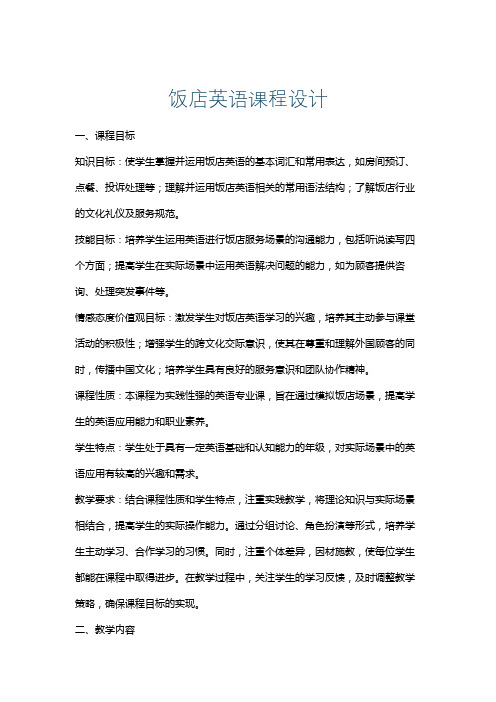
饭店英语课程设计一、课程目标知识目标:使学生掌握并运用饭店英语的基本词汇和常用表达,如房间预订、点餐、投诉处理等;理解并运用饭店英语相关的常用语法结构;了解饭店行业的文化礼仪及服务规范。
技能目标:培养学生运用英语进行饭店服务场景的沟通能力,包括听说读写四个方面;提高学生在实际场景中运用英语解决问题的能力,如为顾客提供咨询、处理突发事件等。
情感态度价值观目标:激发学生对饭店英语学习的兴趣,培养其主动参与课堂活动的积极性;增强学生的跨文化交际意识,使其在尊重和理解外国顾客的同时,传播中国文化;培养学生具有良好的服务意识和团队协作精神。
课程性质:本课程为实践性强的英语专业课,旨在通过模拟饭店场景,提高学生的英语应用能力和职业素养。
学生特点:学生处于具有一定英语基础和认知能力的年级,对实际场景中的英语应用有较高的兴趣和需求。
教学要求:结合课程性质和学生特点,注重实践教学,将理论知识与实际场景相结合,提高学生的实际操作能力。
通过分组讨论、角色扮演等形式,培养学生主动学习、合作学习的习惯。
同时,注重个体差异,因材施教,使每位学生都能在课程中取得进步。
在教学过程中,关注学生的学习反馈,及时调整教学策略,确保课程目标的实现。
二、教学内容本课程以《饭店英语》教材为基础,涵盖以下核心内容:1. 饭店基本词汇与表达:包括房间类型、餐饮、休闲娱乐、投诉处理等模块的单词和短语。
2. 饭店英语语法:重点讲解与饭店服务场景相关的语法结构,如一般现在时、一般过去时、将来时等。
3. 饭店服务场景会话:涵盖预订、接待、点餐、结账等场景的英语对话,培养学生的实际沟通能力。
4. 饭店文化礼仪:介绍饭店行业的基本礼仪规范,提高学生的跨文化交际能力。
教学大纲安排如下:第一周:饭店基本词汇与表达(第一章)第二周:饭店英语语法(第二章)第三周:预订与接待场景会话(第三章)第四周:点餐与投诉处理场景会话(第四章)第五周:结账与告别场景会话(第五章)第六周:饭店文化礼仪及服务规范(第六章)教学内容注重科学性和系统性,结合课程目标,按照由浅入深的原则进行安排。
饭店服务英语第二版教学设计

饭店服务英语第二版教学设计一、教学目标通过本课程的学习,学生应该掌握以下技能:1.熟练掌握饭店服务英语中的日常用语和常见词汇;2.能够在餐厅中提供基本的服务及回答客人问题;3.能够撰写标准的饭店服务英语邮件。
二、教学内容1. 日常用语和常见词汇1.1 问候客人1.见到客人时的问候:Good morning/afternoon/evening, sir/madam.2.客人入座后的问候:Welcome to our restaurant. May I take yourcoat?3.询问客人的需求:Can I get you something to drink? Are youready to order?4.再次问候客人:Enjoy your meal.1.2 餐点1.餐点名称:appetizers, entrees, desserts2.特色餐点:our signature dish, recommended dish3.食材描述:grilled, steamed, sautéed1.3 服务和支付1.建议菜单:our dly specials2.客人选择:What would you like to order?3.可口度及口感:How do you like your steak cooked? Would youlike anything else?4.支付方式:cash, credit card, debit card, travelers checks5.小费:include gratuity, tip1.4 服务员与客人交流1.描述菜品:Our soup of the day is a creamy tomato bisque.2.解决客人问题:I’ll speak to the chef and see if we canaccommodate your request.3.意见反馈:Was everything OK with your meal? Can I get youanything else?2. 实践应用2.1 在餐厅中提供基本服务1.发现有需要帮助的客人并及时为其提供帮助2.端菜、送餐时有礼貌地询问客人是否需要更多帮助3.在客人吃完餐品后及时清理餐具、收取餐费,并观察是否需要帮助点其他餐品或服务2.2 撰写标准的饭店服务英语邮件1.找到合适的模板或者样例信件2.撰写邮件之前确认邮件的主旨,明确传递的信息和目的3.写作过程中需要正确使用语法和标点符号三、教学方法1.边学边练:通过情景模拟和案例实践,帮助学生加深记忆和理解饭店服务英语2.听说读写结合:通过听说读写四个重要环节,全面提高学生对饭店服务英语的掌握程度3.独立思考:通过分组讨论和集体讲评的方式,激发学生独立思考和创新思维能力四、评估方式1.取得优良的成绩:学生应得到最少70%以上的测试分数2.适时纠正笑语错误:学生需要在听说读写等环节中适时纠正语音语句中常见的语言错误3.独立写作邮件:学生需要独立在班级内完成饭店服务英语邮件书写,并进行同学评分五、教学评估在教学过程中,教师应不断关注学生的反馈意见,及时针对性地修改教学内容;并且应在教学结束后及时调查学生掌握情况,从而给出相应的建议,在不同特点的学生中获得更好的教态。
饭店服务英语教案

饭店服务英语教案第一篇:饭店服务英语教案Unit Seven complaints Teaching aims :1.practice the students’ listening ability2.practice the students speaking ability3.let the students know the produces of solving complaints and can use some useful sentences.Teaching focus: 1.the procedures of solving complaints 2.some useful sentences Teaching difficult*how to solve the guests’ complains.Capacity-building methods Reading and speaking.Role play Teaching classes First 2classes Teaching procedures The first 2 classes step1 .learn the reading materialsHow To Deal With Complaints Step2 reading the materials Step3 translate the materials 1.lend an ear to sb/sth = listen patiently and sympathetically 耐心而同情的听某人讲话2.attentive to sb/sth.=give attentive to sb/sth.An attentive audience A good hostess is always attentive to the needs of her guests.好客的女主人能随时留心客人的需要。
饭店英语说课课稿
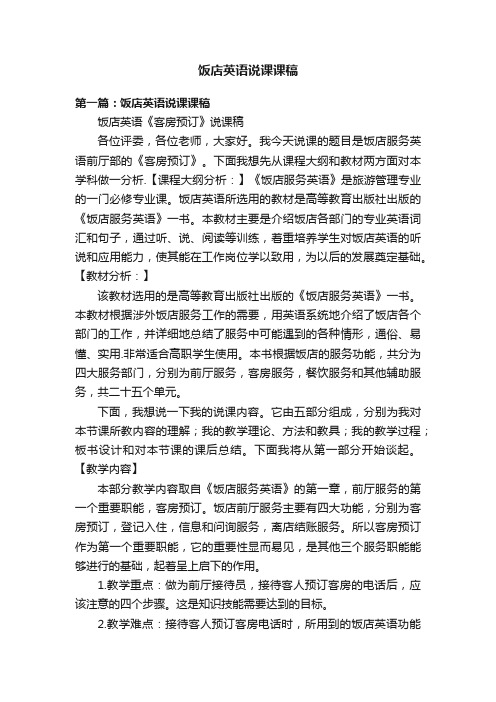
饭店英语说课课稿第一篇:饭店英语说课课稿饭店英语《客房预订》说课稿各位评委,各位老师,大家好。
我今天说课的题目是饭店服务英语前厅部的《客房预订》。
下面我想先从课程大纲和教材两方面对本学科做一分析.【课程大纲分析:】《饭店服务英语》是旅游管理专业的一门必修专业课。
饭店英语所选用的教材是高等教育出版社出版的《饭店服务英语》一书。
本教材主要是介绍饭店各部门的专业英语词汇和句子,通过听、说、阅读等训练,着重培养学生对饭店英语的听说和应用能力,使其能在工作岗位学以致用,为以后的发展奠定基础。
【教材分析:】该教材选用的是高等教育出版社出版的《饭店服务英语》一书。
本教材根据涉外饭店服务工作的需要,用英语系统地介绍了饭店各个部门的工作,并详细地总结了服务中可能遇到的各种情形,通俗、易懂、实用.非常适合高职学生使用。
本书根据饭店的服务功能,共分为四大服务部门,分别为前厅服务,客房服务,餐饮服务和其他辅助服务,共二十五个单元。
下面,我想说一下我的说课内容。
它由五部分组成,分别为我对本节课所教内容的理解;我的教学理论、方法和教具;我的教学过程;板书设计和对本节课的课后总结。
下面我将从第一部分开始谈起。
【教学内容】本部分教学内容取自《饭店服务英语》的第一章,前厅服务的第一个重要职能,客房预订。
饭店前厅服务主要有四大功能,分别为客房预订,登记入住,信息和问询服务,离店结账服务。
所以客房预订作为第一个重要职能,它的重要性显而易见,是其他三个服务职能能够进行的基础,起着呈上启下的作用。
1.教学重点:做为前厅接待员,接待客人预订客房的电话后,应该注意的四个步骤。
这是知识技能需要达到的目标。
2.教学难点:接待客人预订客房电话时,所用到的饭店英语功能句。
只有学会了这些功能句,才能在接听电话时应对自如。
学生根据实际情境需要真正开口讲英语。
解决重难点的方法:1、课堂教学紧紧围绕重点问题来进行,教师要引导学生把理论学习与实际应用结合起来,这样能够帮助学生加深对所学知识的理解和记忆。
饭店英语前厅部教案

饭店英语电子教案Sep 1stSection one: Front OfficePart one: Room ReservationI. Oral part: 1. Questions: a. How to book a room? b. How to ask about the roomrate/price?c. As a reservationist, how to accept /refuse a booking2. Explain and practice the useful expressions.Making a bookinga. a.I’d like to book a room from… to…, please.b. b.Do you have any room free/available from…to…?c. c.Could you let us have a double room for…please?d. d.I’m going to reserve a suite from…to…, please.e. e.I wonder if you could book me a single room with bath?Accepting a bookinga. a.We do have one room free for those days.b. b.Yes, we have a double roo m available from…to….c. c.We can confirm you a room from…to….d. d.We can book you a mini-suite for those days.Refusing a bookinga. Sorry, we are fully booked for those days.b. Sorry, we don’t have any vacancy for…c. Sor ry, we won’t be bale to guarantee you 3 connecting rooms from…to….d. Sorry, we’re booked solid. But we can recommend you another hotel if you like. Asking about the room rate/pricea. a.What’s the room rate per night?b. How much is a single room w ith bath?c. Is breakfast included?d. Can we get some discount for group reservations?e. Is there a deduction for children?Expecting guestsa. We look forward to your stay at our hotel.b. We look forward to your arrival.c. We look forward to receiving you.d. We are expecting your stay with us.3. Simple dialogues: Suppose you are a reservationist, offer you help to the guest when…a. There is no room available. B. You receive a group reservation. II. Listen to the dialoguePart two: RegistrationI. Oral part: 1. Questions: a. As a receptionist, how to ask about the customer’s reservation?b. As a receptionist, how to help the customer with his registration form?c. How to hand the key?2. Explain and practice the useful expressionsGetting information from guests about the reservationa. Have you made a reservation, sir?b. Under whose namewas it made?c. How did you make the reservation, by telex or telephone?d. Did you reconfirm the booking?e. Sorry, there isn’t any room available, would you like us to try another hotel for you, sir?Helping guests with registration forma. Would you fill out this registration form, please? Here is a pen.b. May I have your signature, please?c. May I have your signature, please?d. Well, please write out your nationality/permanent home address/youroccupation/your next destination and passport number etc.Handing the key, etc.a. Here is your key card & key, sir.b. b.Please don’t forget to leave your key & key card at the reception when youcheck out, sir.3. Simple dialogue: A customer with a reservation comes and wants to checkin. ask her to fill out the registration form first and thenpresent her the room card and the key.Sep 8thPart three: Bell ServiceI. Oral part:1. Questions: a. Who is a bell boy?b. How to offer help to your customers as a bellboy?2. Explain and practice the useful expressionsOffering helpa. a.Welcome to our hotel. May I show you to your room?b. b.Let me help you with your luggage.c. c.May I help you with your suitcases, sir?d. d.Leave the luggage with me. I’ll get it up to your room.e. e.Don’t worry. We’ll send you a bellboy in a minute.f. f.Leave the letter with me, I’ll get them delivered.Special courtesy English for bellboya. After you, sir.b. Follow me, please.c. This way,please, sir.d. Please watch your steps, sir.e. Let me help you with your luggage, please.3. Simple dialogue: Play the part of a bellboy, help the guests when there is a fax forJimmy Brown in Room 304.4. Listen to the dialogues.Part four: At the cashier’sI. Oral part:1. Questions: a. What does a cashier do?b. b.How to help the guest change money and check out?2. Explain and practice the useful expressionsOn currency exchangeFor cashiera. a.How much would you like to change?b. b.The exchange rate is subject to alteration without notice.c. What denominations would you like?d. Traveller’s cheques are not valid until they are countersigned.For customersa. I want to change this bank note, please.b. I’d like to exchange some small notes.c. c.I’d like to cash this traveller’s cheque, please.d. d.Can I have my currency exchange receipt, please.On checking outFor cashierExplaining the billa. a.This figure here is for the phone calls you made from your room.b. b.This amount here is for the broken lamp and the soft drinks from themini-bar.c. c.Breakfast is included/excluded/extrad. Item 2 refers to theroom service.When there are miscalculations.a. a.Excuse me for a moment, I’ll check the details.b. b.I’m sorry, this is indeed a mistake. We’ll deduct this amount from your billright away.For customersa. a.I’m leaving this afternoon. Can I have my bill settled, please?b. b.Is this where I can pay my hotel bills?c. I’m checking out today. May I have my bill now?d. We’re leaving this afternoon. Would you get our bill ready for us? Room 404e. C ould you please explain this to me. I don’t think the figure should go that high.3. Simple dialogue: Mr. Thomson is checking out. As a cashier, please explainthe bill to him and ask him to show you his means ofidentifications and say good-bye to him.Sep 15thSection two: HousekeepingPart one: Chamber serviceI. Oral part:Explain and practice the useful expressions.Doing the rooma. a.When would you like me to do/make up your room?b. b.What time would it be convenient, sir?c. Would you like me to clean up /tidy up your room right now?Asking for permissiona. a.May I do the turn-down service for you now?b. b.We’d like to clean t he room. May we do it now?c. c.Would you like me to come back later?d. d.Would it be convenient if I returned at 9:45?Saying politely when disturbing the guesta. a.I’m sorry to disturb you.b. I hope I haven’t disturbed yo u.b. b.Sorry to have taken up your time.II. Listen to the dialogues.Part two: Laundry serviceI. Oral part: 1. Explain and practice the useful expressionsGiving information about laundrya. a.For laundry service, dial 6 and you will get housekeeping.b. b.The laundry forms and bags are in the top right handed drawer of thewriting table.c. c.The rate chart is contained in the stationery folder in your dresser’sdrawer, madam.Giving special requirements.a. a.I have some laundry to be done.b. I want to have a pantdry-cleaned.c. I’d like my sweater to be washed by hand in cold water.Telling about the extra chargea. a.We charge fifty extra for express.b. We deliver it within 4 hours at a50% extra charge.c. There is an extra charge of 50%for quick service.Comforting the guesta. a.Don’t worry. We have an express laundry service here.b. b.Don’t worry. We can arrange it for you.c. Don’t worry. Leave itto me.2. Simple dialogue:II. Listen to the dialogues.Se p 29thSection Three: Food and BeveragesPart one: Restaurant reservationsI. Oral part: 1. Explain and practice the useful expressionsAsking about the time of a reservationa. a.When would you like your table?b. b.When should we expect you?Refusing a reservationa. a.There aren’t any tables left for eight, but we can book one for you at nine.b. b.I’m terribly sorry. The restaurant is full.2. Role play: You want to reserve a table for three this evening at 6:00. II. Listen to the dialogues.Part two: Receiving the guestI. Oral part: 1. Explain and practice the useful expressionsAsking about a favorite tablea. a.Will this table be all right?b. b.Would you like to sit by the window?c. c.Would you prefer/rather sit near the window?d. d.Do you have a preferred table?2. Role play: You’ve got a reservation. The first table the waiter gives youis too near the door. You’d rather sit near the window.II. Listen to the dialogues.Part three: Taking ordersI. Oral part: 1. Explain and practice the useful expressionsRecommending dishesa. a.Why don’t you try…? It’s very good.b. b.I would suggest/recommend you have a taste of …c. c.Today, our specialty is …Asking about a dishWhat is … exactly?Asking for special instruction on fooda. a.How would you like your steak cooked?b. b.How do you like your steak done/prepared?2. Role play。
(完整版)饭店英语教案.doc
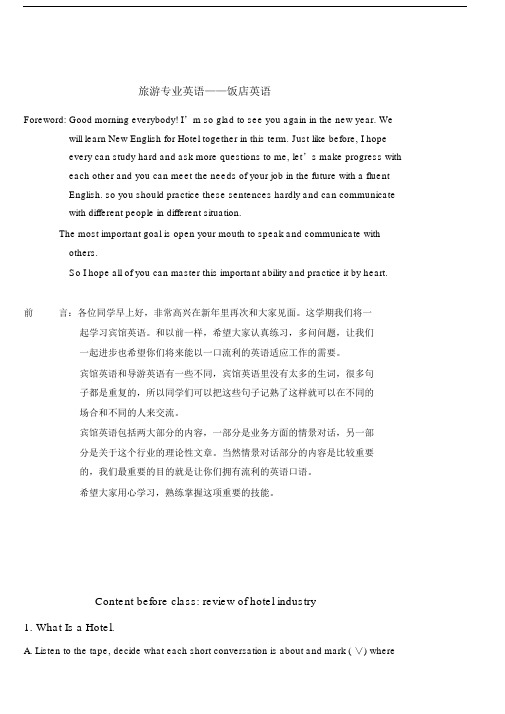
旅游专业英语——饭店英语Foreword: Good morning everybody! I’m so glad to see you again in the new year. We will learn New English for Hotel together in this term. Just like before, I hopeevery can study hard and ask more questions to me, let’s make progress witheach other and you can meet the needs of your job in the future with a fluentEnglish. so you should practice these sentences hardly and can communicatewith different people in different situation.The most important goal is open your mouth to speak and communicate withothers.So I hope all of you can master this important ability and practice it by heart.前言:各位同学早上好,非常高兴在新年里再次和大家见面。
这学期我们将一起学习宾馆英语。
和以前一样,希望大家认真练习,多问问题,让我们一起进步也希望你们将来能以一口流利的英语适应工作的需要。
宾馆英语和导游英语有一些不同,宾馆英语里没有太多的生词,很多句子都是重复的,所以同学们可以把这些句子记熟了这样就可以在不同的场合和不同的人来交流。
宾馆英语包括两大部分的内容,一部分是业务方面的情景对话,另一部分是关于这个行业的理论性文章。
《饭店英语》课程设计

《饭店英语》课程整体教学设计(2010~2011学年第2学期)课程名称:《饭店英语》所属系部:外语教学部制定人:合作人:制定时间:2011年xx学院课程整体教学设计一、课程基本信息二、课程目标设计1.总体目标:《饭店英语》是培养学生良好的专业素质,掌握酒店服务英语常用的词汇、短语和句型,打好扎实的英语语言功底,具备酒店英语交际能力,具体包括能够与外宾进行沟通和交流,能够在酒店前厅、客房、餐厅等具体工作岗位运用所学英语完成对客服务接待,具有良好的心理素质、应变能力和继续学习能力。
2. 能力目标①酒店英语礼仪服务得体应用的能力。
②用英语与客人交流沟通的能力。
③运用英语提供前厅部、客房部、餐饮部等不同岗位不同任务要求下的服务接待实操能力。
④运用英语销售酒店产品的能力。
⑤运用英语处理投诉、解决突发事件的应变能力。
⑥运用英语进行个性化服务和创新服务的能力。
3. 知识目标①掌握酒店服务英语常用的词汇、短语和句型、打好扎实的英语语言功底。
②明确各个岗位的服务程序,掌握不同岗位、不同任务下的服务程序规范和礼仪知识。
③以岗位标准为依据,通过对各模块的训练,掌握前厅、商务中心、客房、餐饮、会议和康乐部的服务基本知识。
4. 素质目标①培养学生热爱酒店事业,具备较高的职业道德素质。
②培养学生良好的团队精神、协作意识及敬业精神。
③使学生具备良好的心理素质和应变能力,能自信、大胆、流利地与外籍人士交流。
④为学生步入社会和进一步学习打好基础,也为酒店服务业的未来发展培养更多实用的高素质、高技能型人才。
三、教学内容安排四、教学实施1.将多媒体教室作为一体化教室,采用实地、实境练习模式。
2.以岗位实际工作任务作为具体教学内容,以岗位标准作为能力目标的依据,采用项目教学方法。
3.以学生为主体,教师为主导。
4.实地情景模拟,角色扮演练习。
5.课堂展示,效果评价五、成绩考核期末总成记100%=平时考核(出勤、学习态度)30%+课堂活动、作业(口语)30%+考试(期中、期末)40%六、第一节课梗概第一步、课程介绍(5)(1)课程定位《饭店英语》是酒店管理专业的一门专业基础课程。
饭店英语教案unit5
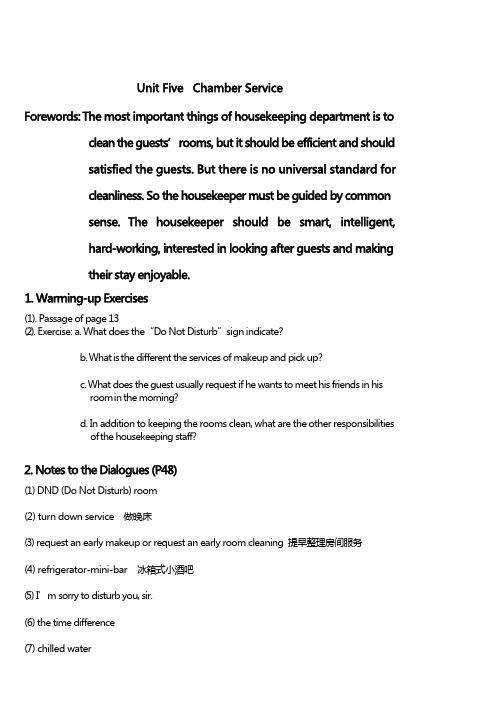
(1). Passage of page 13(2). Exercise: a. What does the“Do Not Disturb”sign indicate?b. What is the different the services of makeup and pick up?c. What does the guest usually request if he wants to meet his friends in hisroom in the morning?d. In addition to keeping the rooms clean, what are the other responsibilitiesof the housekeeping staff?(1) DND (Do Not Disturb) room(2) turn down service 做晚床(3) request an early makeup or request an early room cleaning 提早整理房间服务(4) refrigerator-mini-bar 冰箱式小酒吧(5) I’m sorry to disturb you, sir.(6) the time difference(7) chilled water客房部常用词汇表:escalator 自动楼梯 tea trolley 活动茶几 elevator, lift 电梯floor 楼层,地板bookshelf 书架 night table 床头柜 drawer 抽屉carpentry (总称)木器ground floor (英)底,层, first floor (英)二楼, (美)second floor (英)三楼,tea table 茶几一楼一楼 (美)二楼bedclothes 床上用品cabinet 橱柜 folding screen 屏风 spring 弹簧quilt 被子switch 开关 hanger 挂钩 cushion 靠垫,垫子mattress 床垫Venetian blind 百叶窗帘 plug 插头 socket 插座,插口thermos 热水瓶curtain 窗帘 wall plate 壁上挂盘 sitting room 起居室transformer 变压器wastebasket 字纸篓 Chinese painting 国画 voltage 电压另加的 Notes:1. check-out room 走房2. Room Center 房务中心3. Room status report 房况表4. PA cleaner 公共场所保洁员5. baby-sitting 托婴服务(Acting and translating)(1) Doing the room(2) Promising to take actions(3) Offering help(4) Telling the guest about services以下部分为第五单元中有的听力练习部分,练习书上为六单元.∨Arrival List Room Statues Check-out List Bed Occupancy list Front Office→HousekeepingHousekeeping→Front OfficeA: How does the Housekeeping Dept. coordinate with the Front Office?B: The Front Office provides the Housekeeping Dept. with the arrival list, particularly ( ).A: What else?B: The Front Office also provides the check-out room list for the Housekeeping.A: ( ) by the check-out room?B: It means a room to be vacated ( ) the guest’s stay. The Housekeeping Dept.staff have to get these rooms ready ( ) by the Front Office.A: Then what does the Housekeeping Dept. offer to the Front Office?B: The room status report is compiled ( ) and sent to the Front Office.A: I see. Thank you.1.2.3.4.5.(练习书上为七单元).∨1. What are the qualities a baby-sitter should have?2. How much should the guest pay for the baby-sitting service?3. What formalities should the guest go through for the baby-sitting service?4. How can the guest pay for the baby-sitting service?Room Center (C): Good morning. Room Center. How may I help you?Guest (G): This is Jane Hobbs calling from Room 901. Could you send someone to( ) my child this evening?C: Certainly. We have baby-sitting service. The baby-sitters are all reliable andexperienced.G: Good. Could you tell me ( )? C: It’s 20 yuan an hour, for a minimum of four hours.Laundry ServiceInquiry 1 Inquiry 2 Inquiry 3 Inquiry 4 Inquiry 5Buying Baby-sittingThings Serviceon RequestShoe-shining Offering ServiceExtra ThingsG: Oh, that’s ( )C: Please wait a moment. We ’ll send you a confirmation form for you to sign.G: Shall I pay in cash?C: Not necessary. We ’ll add i t ( ).Dialog 1: Laundry Service(The guest is talking with the room attendant about the laundry services.)Listen to the tape and answer the following questions:1. What to do if the guest has some laundry?2. When the guest can usually get his laundry back?3. What the hotel ’s policy on laundry damage i s?Dialog 2: Dealing with a Difficult Guest(Mrs. Anderson’s diamond necklace is missing. She steps into the Housekeeper ’s office angrily.)Listen to the tape and answer the following questions:1. Why the hotel should not be held responsible for the guest ’s lost valuables?2. Why the General Manager and the Housekeeper should say the same thing in dealingwith groundless complaints.a. Just read the Service Information Booklet. Everything is in it.b. Don’t you remember I’ve already told you how to use the minijar?c. That’s not my department. Just contact the reception.d. The button came off before we received your dress. It ’s not our fault.Housekeeping 客房服务Key Sentences (重点句子)99. Housekeeping. May I come in?我是客房的,可以进来吗?100. When would you like me to do your room, sir?您要我什么时间来给你打扫房间呢,先生?101. You can do it now if you like.如果您愿意,现在就可以打扫。
《In the Restaurant》 说课稿

《In the Restaurant》说课稿尊敬的各位评委老师:大家好!今天我说课的内容是《In the Restaurant》。
下面我将从教材分析、学情分析、教学目标、教学重难点、教学方法、教学过程以及教学反思这几个方面来展开我的说课。
一、教材分析《In the Restaurant》是教材版本教材中单元名称的一个重要部分。
本单元的主题是围绕在餐厅的场景展开,旨在让学生学习与餐厅相关的词汇、句型和对话,培养学生在实际生活中运用英语进行交流的能力。
这一内容既贴近学生的生活实际,又具有较强的实用性和趣味性。
通过学习,学生能够了解餐厅的基本用语和点餐流程,为今后的英语学习和实际应用打下良好的基础。
二、学情分析本次授课的对象是年级的学生,他们经过了一段时间的英语学习,已经具备了一定的英语基础知识和语言技能。
但是,他们在口语表达和实际运用方面还存在一些不足,需要更多的练习和实践机会。
同时,这个年龄段的学生活泼好动,好奇心强,喜欢直观形象的教学方式。
因此,在教学过程中,我将采用多种教学方法和手段,激发学生的学习兴趣,提高他们的学习积极性。
三、教学目标基于对教材和学情的分析,我制定了以下教学目标:1、知识目标(1)学生能够掌握与餐厅相关的词汇,如menu, waiter, waitress, dish, steak, salad 等。
(2)学生能够熟练运用句型“Can I have?” “I'd like ” “How much is?” 等进行点餐和询问价格。
2、能力目标(1)能够听懂关于在餐厅点餐的对话,并获取关键信息。
(2)能够用所学的英语在餐厅进行简单的交流,如点餐、询问价格等。
3、情感目标(1)培养学生学习英语的兴趣,增强他们的自信心。
(2)让学生了解不同国家的饮食文化,培养他们的跨文化意识。
四、教学重难点1、教学重点(1)掌握与餐厅相关的词汇和句型。
(2)能够在实际情境中运用所学的词汇和句型进行点餐和交流。
饭店情景英语教学设计
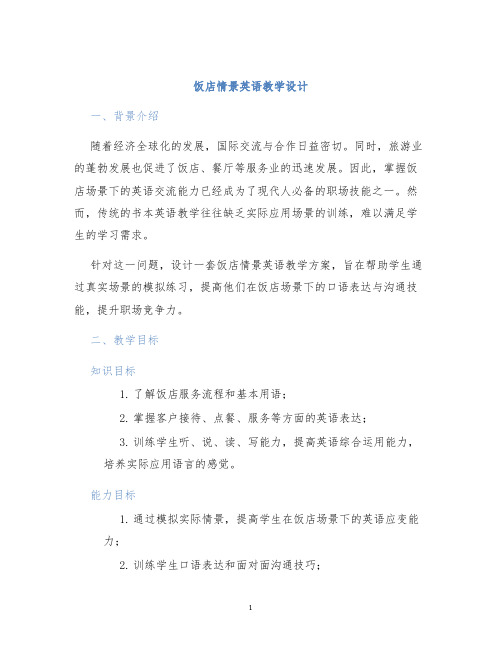
饭店情景英语教学设计一、背景介绍随着经济全球化的发展,国际交流与合作日益密切。
同时,旅游业的蓬勃发展也促进了饭店、餐厅等服务业的迅速发展。
因此,掌握饭店场景下的英语交流能力已经成为了现代人必备的职场技能之一。
然而,传统的书本英语教学往往缺乏实际应用场景的训练,难以满足学生的学习需求。
针对这一问题,设计一套饭店情景英语教学方案,旨在帮助学生通过真实场景的模拟练习,提高他们在饭店场景下的口语表达与沟通技能,提升职场竞争力。
二、教学目标知识目标1.了解饭店服务流程和基本用语;2.掌握客户接待、点餐、服务等方面的英语表达;3.训练学生听、说、读、写能力,提高英语综合运用能力,培养实际应用语言的感觉。
能力目标1.通过模拟实际情景,提高学生在饭店场景下的英语应变能力;2.训练学生口语表达和面对面沟通技巧;3.提高学生应变能力和培养职场素养。
三、教学内容1、客户接待教学内容包括:饭店客户接待的流程和用语、问候客人、引导客人就座、为客人提供菜单、介绍餐厅特色菜、推荐菜品等。
2、点餐过程教学内容包括:前菜、主菜、甜品和饮料的英文表达、如何了解客人的口味、如何介绍菜品等。
3、服务过程教学内容包括:做好服务细节、提供主动服务、协调适当的节奏等。
四、教学方法1、场景还原法采用实景还原模拟的方式,将课堂变成饭店现场,让学生亲身体验英语交流的流程和应对能力,加深语言记忆和复习的效果。
2、角色扮演法创造情景,让学生扮演不同角色,进行交流练习,培养学生的自信和英语口语表达能力。
3、师生互动法教师与学生互动,并进行现场点评、指导和纠正,及时调整学生的学习方向,帮助学生克服不足。
五、教学评估根据学生在实践中的表现进行综合评价。
对于表现优秀的学生,可视为学生英语表达能力提高的肯定,并给予激励和支持。
对于表现较差的学生,要及时发现问题,通过多次练习和反复训练,帮助学生提高问题解决能力。
同时,要针对学生的不同差异性,采取个性化学习策略,引导学生在相互合作、共同进步的氛围中不断提升自己的英语水平与职业素养。
饭店英语教案unit8、9

Unit Eight At a Chinese RestaurantForewords: Cooking in China has age-long history. What the Chinese eat differs according to region, climate, tradition, wealth andpersonal preference. As a waiter or waitress, you not onlyhave to be professional in your work, but also have to beknowledgeable about Chinese cuisine.1. Warming-up Exercises(1). Passage of page 71(2). Exercise: a. Do you know the meaning of table service? What is the proper way ofoffering table service?b. Do you know the normal service for Chinese banquet?c. Is the menu important? What are some of the factors that affect the menuplanning?d. What are the features of Chinese cuisine?e. How to translate the Chinese dishes into English?f. Can you tell your class how to make your favorite dishes?2. Notes to the Dialogues (P75)3. Dialogues of Teaching Material(Acting and translating)4. Useful Sentence Patterns(1) Asking about the time of a reservationWhen would you like your table?What time would you like your table?When are you coming in on Wednesday evening?For what time?What time would you like to arrive?(2) Giving information about the restaurant hoursI’m sorry. We are not open on Mondays.We are open from 8:00 a.m. until 10:00 p.m.Breakfast from 6:00 to 10:00(3) Seating the guestHow many are there in your party?We have a window table reserved for you.Would you come with me?Would you like to sit at the counter or would you prefer a table in the dinning room?I do apologize for the delay. Your table’s ready now.(4) Asking the guest if he’s ready to orderAre you ready to order?Would you like to order now?May I take your order now?(5) Recommending something to the guestI’d suggest the chef’s delight: sour soup, Sichuan style.May I suggest you try the King Prawn? The chef recommends it.Roast Duck is a specialty here, I should say.Unit Nine At a Western RestaurantForewords: There are mainly five kinds of restaurant services. They are golden service, silver service, plate service, buffet service andtake-away service. The first three kinds of services aresit-down services and a buffet service can be both a sit-downone and a stand-up one. Take-away service is usuallyassociated with snack bars and fast food outlets. In this unit,we are going to learn how to provide good sit-down service.1. Warming-up Exercises(1). Passage of page 81(2). Exercise: a. What do table d’hote and a la carte mean?b. What kind of meal is a coffee shop served?c. What is a light meal?d. Where do hotel guests often eat their heavy meal of the day?e. Where can hotel guests have something for meal except for going to acoffee shop or dinner restaurant?2. Notes to the Dialogues (P84)3. Dialogues of Teaching Material(Acting and translating)4. Useful Sentence Patterns(1) Declining reservationsI’m sorry, there aren’t any tables left for 8:00 p.m., but we can give you a table at 10:30 p.m.I’m sorry. The restaurant if full.I’m sorry, sir. I’m afraid we’re fully booked for that time.(2) Telling the guest something unavailableI’m sorry, there are no chops left.I’m sorry. We haven’t got any more lobster today. Maybe you would like to have it tomorrow.I’m afraid that this vegetable is not in season. Would you like to try something else?(3) Asking the guest what he’d like to haveWhat would you like?Would you like care for a drink before dinner?What would you like as a starter?What kind of drink would you like?(4) Explaining a dishIt is lamb cooked with herbs and served with spaghetti.It is veal breaded and deep fried to golden brown and served with cream gravy.(5) Setting the billWe can charge it to your room.You can pay with traveler’s checks.You can sign for the drinks you’ve ordered.You need put your address on the back of the check, please.Could you sign here, please?。
饭店英语教案
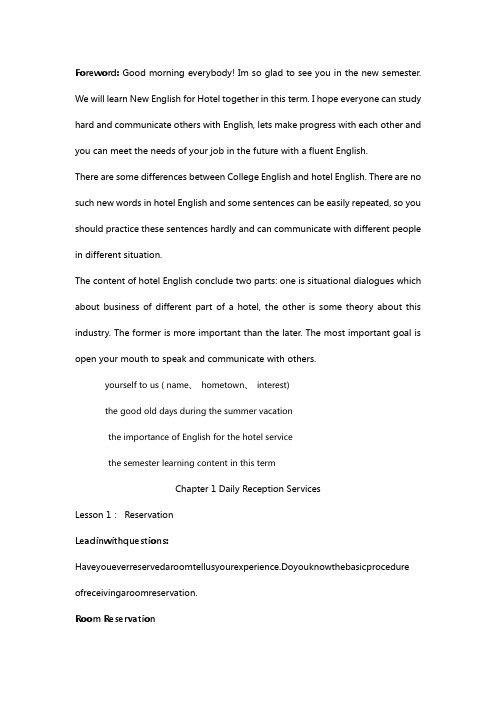
Foreword: Good morning everybody! Im so glad to see you in the new semester. We will learn New English for Hotel together in this term. I hope everyone can study hard and communicate others with English, lets make progress with each other and you can meet the needs of your job in the future with a fluent English.There are some differences between College English and hotel English. There are no such new words in hotel English and some sentences can be easily repeated, so you should practice these sentences hardly and can communicate with different people in different situation.The content of hotel English conclude two parts: one is situational dialogues which about business of different part of a hotel, the other is some theory about this industry. The former is more important than the later. The most important goal is open your mouth to speak and communicate with others.yourself to us ( name、hometown、interest)the good old days during the summer vacationthe importance of English for the hotel servicethe semester learning content in this termChapter 1 Daily Reception ServicesLesson 1:ReservationLeadinwithquestions: Haveyoueverreservedaroomtellusyourexperience.Doyouknowthebasicprocedure ofreceivingaroomreservation.Room ReservationReservations are an important Front Office function because most guests make arrangements in advance of their hotel stay. An effective reservation process can enhance the ability of the Front Office to plan, to coordinate, and to staff Front Office activities.There are six main steps involved in the reservation process. First, the reservationist receives an inquiry in person, over the phone, in the mail, by fax, or through a central reservation system. Second, the reservationist compares the inquiry with previous reservations to determine the availability of rooms. Third, the reservationist creates a telephone number, the number of people in a guest’s party, the expected time of arrival, and any special requirements. Fourth, the reservationist maintains the reservation record by making any changes or cancellations as needed. Finally, the reservationist produces management reports that summarize daily reservations activities.There are several types of room reservations in our business. For guests who want to be certain that rooms are available upon their arrival, the hotel can arrange a guaranteed reservation. In doing so, guests agree to pay for their rooms even if the rooms are not used. The hotel will hold rooms for guests still check-out time on the day following the expected day of arrival. Otherwise the reservations are non-guaranteed. While there are several types of guaranteed reservations, the most common way is the credit card guaranteed reservations, where the hotel keeps records of the guest’s credit card account number.The third type is confirmed reservations. It details the intent of both parties andincludes the material points of the agreement. If the reservation is made earlier enough, the hotel may mail the guest a written confirmation, which the guest is expected to produce at registration.Hotel may also establish other ways of reservations for their own use, based on criteria such an type of guest or source of reservation. Examples include VIP reservations, convention delegate reservations, travel agent reservations, and paid-in-advance reservations. All these belong to the fourth type—hotel-specific reservations.Teachingaims:thestudents listeningabilitythestudents’speakingability thestudentsmasterthebasicproceduresofreservationTeachingfocus:Basicprocedures:*greetings*dateofarrivalanddeparture*roomtypes*address*telephonenumber*conformation.Teachingdifficult*somenewwordsandphrases*someusefulsentencestranslationCapacity-buildingmethodsReadingandspeaking. MakingdialoguesPractice1. ask students to read the dialogue.the students practice the dialogue.3. give the situation to make a dialogue.(1) You call to a hotel to reserve a room, but the clerk tells you it’s already fully booked. What will you do(2) Make a call to a hotel to book a room. Be sure to mention your requirements, the date you’ll arrive and the time you expect to stay. Also don’t forget to inquire about the price.Lesson 2 :Hotel Information and Location、Room Demands and Facilities Check homeworktwo students to read the dialogue2. ask sb. To translate some sentences.3 Revise dialogues from Lesson1. Have several pairs, other than the pairs that were chosen in the last lesson to share their dialogues with the class.rveiew4. Ask some questions(1) the basic procedures of reservation.(2) attention points when fully booked.*polite* make apologize* give some suggestions.Leadinwithquestions:1. What is a hotelAt first, an establishment held out by the proprietor as offering food, drink and, if so required, sleeping accommodation.The hotel of today is a highly organized commercial entity, which consists of many departments and there are five most essential divisions namely, the Room Division, the Food & Beverage Division, the Sales & Marketing Division, the Accounting Division and the Maintenance Engineering Division.2. What services and facilities does a hotel provideBesides accommodations, food and beverages, such other services as providing modern telecommunication facilities, convention halls and recreation centers, swimming pools, body building rooms, shopping centers, banks, mails, bookstores, fax, flower shops and beauty parlors.3. Why do we say that serving guests is indeed an artService is understanding, anticipating and fulfilling needs of others, and doing it graciously and willingly. Whoever the guest is, he or she must be treated as a VIP. In this sense we say service first and guests foremost.I. Greetingsandintroductionof hotel Information and Location、Room Demands and FacilitiesII StudythenewwordsAskstudentstoreadthenewwords,andafterlisteningtotheirreading,correcttheirwrong pronunciation. Explaintheusageofsomewordsbyexamples.III. Introducesomebackgroundinformationand therelatedworkingsituations.To be able to Know the basic hotel services and amenitiesTell the hotel departments and their dutiesUse courtesy English when serving guestsPublicize the new concept of “ Green Hotel”IV. ExplainthetextsandletthestudentstoactthemoutAt last1. ask students to read the dialogue.the students practice the dialogue.3. give the situation to make a dialogue. thestudentscanuseexpressionstoplaytherole.Theyshouldsetupmorescenestomakedi aloguesandputthesentencesintouse.Lesson 3 :Prices and Payments、Checking In、Exchanging Foreign Currencies、Asking the Way、Checking OutCheck homeworktwo students to read the dialogue2. ask sb. To translate some sentences.2 Revise dialogues from Lesson2. Have several pairs, other than the pairs that were chosen in the last lesson to share their dialogues with the class.1.Learning Goals:To be able to exchange the foreign currencyChange coinsCheck outKnow the cashier’s work procedureto master some words and expressions about check-in, departure,pay in cash, pay by credict card, check-out time Teachingfocus:1.To identify the kinds of foreign currencies, credit cards, cheques and coins 2.exchange money3.Change coins4. What a cashier pays attention to5. Checking In (Check in is an important function of the Front Office, In this unit, the students should know the information included in registration forms, how to register FITS, how to register groups and how to receiving walk-in guests.)6. Asking the Way (What will you do when a stranger asks you about the way in your limited time) PracticeExcuse me how can I get to Xidan Shopping CenterYou can go there by the bus and get off at the Xidan stop.The bus stop is just in front of the Bank of Beijing opposite our hotel.Just go out of the hotel and turn left. The travel agency is just about 100 meters down the road.You can go to Wangfujing Street by taxi.Let me show on the map.The Forbidden City is to the north of Tian’anm en Square.You can’t miss it.Lesson 4 :Depositing Goods、Collecting Items、Complaints and Problems、Dealing with ComplaintsCheck homeworktwo students to read the dialogue2. ask sb. To translate some sentences.2 Revise dialogues from Lesson3. Have several pairs, other than the pairs that were chosen in the last lesson to share their dialogues with the class.Learning Goals:1.The aim of the class is to get through the related information of DepositingGoods、Collecting Items、Complaints and Problems、Dealing with Complaints 2. The requests for the students are to practice the useful expressions of Depositing Goods、Collecting Items、Complaints and Problems、Dealing with ComplaintsIn this class, I ask Ss to make up some dialogue with their partner. And every student have a chance to give us a proformance. Thus in this way can student try their best to organize their language and take pari in class actively. Teachingfocus:Step1: learn new wordsStep2: learn useful sentenceStep3: useful conversation Step4: useful paragraph。
饭店服务英语课程设计

饭店服务英语课程设计课程概述本课程旨在帮助职场从业人员或准备从事饭店服务工作的学生提升英语沟通能力,掌握饭店服务中必备的英语词汇、口语表达技巧以及文化礼仪。
课程涵盖了从迎宾接待、点菜服务到结账等环节的英语表达。
课程目标1.掌握饭店服务中常见的英语词汇及其运用方法;2.学会与客人沟通并协助客人解决问题;3.掌握点菜、送餐、结账等服务环节的英语表达;4.培养良好的文化礼仪意识。
课程内容第一课:迎宾接待课程目标1.学习用英语接待客人;2.学会核对客人预定信息;3.学会引导客人到座位就坐;4.学会简单的文化礼仪。
课程内容1.接待客人的基本英语表达;2.核对客人的预定信息;3.指引客人到座位就坐;4.介绍服务员的姓名及服务流程;5.简单的文化礼仪。
学习方法1.学习常用的客人问候语;2.观看相关的服务接待场景视频;3.角色扮演,模拟接待客人的场景。
第二课:点菜服务课程目标1.掌握常用的餐厅用语;2.学会英文菜单的阅读;3.掌握菜品的介绍;4.学会询问客人的口味偏好。
课程内容1.餐厅用语的英语表达;2.英文菜单的阅读方法;3.菜品的介绍及推荐;4.询问客人的口味喜好。
学习方法1.学习常见的餐厅用语;2.阅读英文菜单并理解菜品的含义;3.观看#服务员点菜场景#视频,掌握菜品介绍和口味咨询技巧;4.培养在不同情境下灵活应对的能力。
第三课:厨房与服务员的协作课程目标1.了解厨房的英语单词;2.学会与厨师沟通;3.掌握服务员与厨师的配合;4.学会转达客人的特殊要求。
课程内容1.厨房的英语单词;2.服务员与厨师的沟通方法;3.展示菜品及介绍菜品的方式;4.转达特殊要求。
学习方法1.学习厨房常用的英语表达;2.观看视频了解服务员和厨师的沟通方式;3.角色扮演,模拟服务员到厨房取餐及介绍菜品的场景。
第四课:结账课程目标1.学会英语的结账流程;2.掌握不同结账方式的英语表达;3.学会处理客人的问题和疑虑;4.掌握慰问客人的语言。
At the Restaurant优秀教案
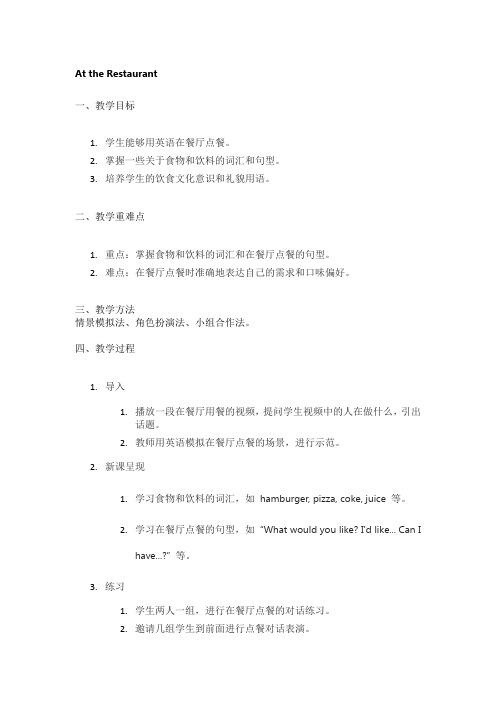
At the Restaurant
一、教学目标
1.学生能够用英语在餐厅点餐。
2.掌握一些关于食物和饮料的词汇和句型。
3.培养学生的饮食文化意识和礼貌用语。
二、教学重难点
1.重点:掌握食物和饮料的词汇和在餐厅点餐的句型。
2.难点:在餐厅点餐时准确地表达自己的需求和口味偏好。
三、教学方法
情景模拟法、角色扮演法、小组合作法。
四、教学过程
1.导入
1.播放一段在餐厅用餐的视频,提问学生视频中的人在做什么,引出
话题。
2.教师用英语模拟在餐厅点餐的场景,进行示范。
2.新课呈现
1.学习食物和饮料的词汇,如hamburger,pizza,coke,juice等。
2.学习在餐厅点餐的句型,如“What would you like?I'd like...Can I
have...?”等。
3.练习
1.学生两人一组,进行在餐厅点餐的对话练习。
2.邀请几组学生到前面进行点餐对话表演。
4.巩固拓展
1.进行“Restaurant Role-play”,学生分成小组,模拟餐厅场景,进
行角色扮演。
2.讨论不同国家的饮食文化差异。
5.总结
1.回顾本节课所学的内容,强调饮食文化的多样性和礼貌用语的重要
性。
2.布置作业:用英语写一篇关于自己在餐厅用餐的短文。
饭店英语小学教案模板

课程名称:饭店英语年级:小学三年级课时: 2课时教学目标:1. 学生能够听懂并说出基本的饭店用语,如“Goodmorning/afternoon/evening”,“May I help you?”,“What would you like to order?”等。
2. 学生能够理解并使用简单的饭店服务流程,如点餐、结账等。
3. 培养学生的口语交际能力,提高在实际情境中运用英语的能力。
教学重点:- 基本饭店用语的听力和口语表达。
- 饭店服务流程的理解和模拟。
教学难点:- 在实际情境中灵活运用饭店英语。
教学准备:- 多媒体课件,包括饭店图片、相关词汇和句子。
- 饭店英语卡片或单词卡片。
- 小道具,如菜单、账单等。
教学过程:第一课时一、导入(10分钟)1. 通过展示饭店图片,引导学生谈论自己最喜欢的饭店。
2. 提问:“What do you usually do in a restaurant?”(你在饭店里通常做什么?)1. 展示饭店常用词汇卡片,如:menu(菜单)、order(点餐)、bill(账单)、water(水)、coffee(咖啡)等。
2. 通过情景模拟,让学生模仿点餐和结账的对话。
- A: Good morning, sir/madam. May I help you?- B: Yes, please. I'd like to order a hamburger and a glass of water.- A: Sure. Your hamburger and water will be ready soon.3. 播放饭店服务流程的英语视频,让学生跟读并模仿。
三、练习(15分钟)1. 分组练习,每组扮演服务员和顾客,进行点餐和结账的对话。
2. 教师巡回指导,纠正发音和语法错误。
四、总结(5分钟)1. 回顾本节课所学内容,强调饭店英语的重要性。
2. 鼓励学生在生活中多练习,提高实际应用能力。
- 1、下载文档前请自行甄别文档内容的完整性,平台不提供额外的编辑、内容补充、找答案等附加服务。
- 2、"仅部分预览"的文档,不可在线预览部分如存在完整性等问题,可反馈申请退款(可完整预览的文档不适用该条件!)。
- 3、如文档侵犯您的权益,请联系客服反馈,我们会尽快为您处理(人工客服工作时间:9:00-18:30)。
Foreword:Good morning everybody! Im so glad to see you in the new semester. We will learn New English for Hotel together in this term. I hope everyone can study hard and communicate others with English, lets make progress with each other and you can meet the needs of your job in the future with a fluent English.There are some differences between College English and hotel English. There are no such new words in hotel English and some sentences can be easily repeated, so you should practice these sentences hardly and can communicate with different people in different situation.The content of hotel English conclude two parts: one is situational dialogues which about business of different part of a hotel, the other is some theory about this industry. The former is more important than the later. The most important goal is open your mouth to speak and communicate with others.yourself to us ( name、 hometown、 interest)the good old days during the summer vacationthe importance of English for the hotel servicethe semester learning content in this termChapter 1 Daily Reception ServicesLesson 1: ReservationLeadinwithquestions:Haveyoueverreservedaroomtellusyourexperience.Doyouknowthebasicprocedureofreceivingaroomreservation.Room ReservationReservations are an important Front Office function because most guests make arrangements in advance of their hotel stay. An effective reservation process can enhance the ability of the Front Office to plan, to coordinate, and to staff Front Office activities.There are six main steps involved in the reservation process. First, the reservationist receives an inquiry in person, over the phone, in the mail, by fax, or through a central reservation system. Second, the reservationist compares the inquiry with previous reservations to determine the availability of rooms. Third, the reservationist creates a telephone number, the number of people in a guest’s party, the expected time of arrival, and any special requirements. Fourth, the reservationist maintains the reservation record by making any changes or cancellations as needed. Finally, the reservationist produces management reports that summarize daily reservations activities.There are several types of room reservations in our business. For guests who want to be certain that rooms are available upon their arrival, the hotel can arrange a guaranteed reservation. In doing so, guests agree to pay for their rooms even if the rooms are not used. The hotel will hold rooms for guests still check-out time on the day following the expected day of arrival. Otherwise the reservations are non-guaranteed. While there are several types of guaranteed reservations, the most common way is thecredit card guaranteed reservations, where the hotel keeps records of the guest’s credit card account number.The third type is confirmed reservations. It details the intent of both parties and includes the material points of the agreement. If the reservation is made earlier enough, the hotel may mail the guest a written confirmation, which the guest is expected to produce at registration. Hotel may also establish other ways of reservations for their own use, based on criteria such an type of guest or source of reservation. Examples include VIP reservations, convention delegate reservations, travel agent reservations, and paid-in-advance reservations. All these belong to the fourth type—hotel-specific reservations.Teachingaims:thestudents listeningabilityt hestudents’speakingability thestudentsmasterthebasicproceduresofreservationTeachingfocus:Basicprocedures:*greetings*dateofarrivalanddeparture*roomtypes*address*telephonenumber*conformation.Teachingdifficult*somenewwordsandphrases*someusefulsentencestranslationCapacity-buildingmethodsReadingandspeaking. MakingdialoguesPractice1. ask students to read the dialogue.the students practice the dialogue.3. give the situation to make a dialogue.(1) You call to a hotel to reserve a room, but the clerk tells you it’s already fully booked. What will you do(2) Make a call to a hotel to book a room. Be sure to mention your requirements, the date you’ll arrive and the time you expect to stay. Also don’t forget to inquire about the price.Lesson 2 :Hotel Information and Location、Room Demands and Facilities Check homeworktwo students to read the dialogue2. ask sb. To translate some sentences.3 Revise dialogues from Lesson1. Have several pairs, other than the pairs that were chosen in the last lesson to share their dialogues with the class. rveiew4. Ask some questions(1) the basic procedures of reservation.(2) attention points when fully booked.*polite* make apologize* give some suggestions.Leadinwithquestions:1. What is a hotelAt first, an establishment held out by the proprietor as offering food, drink and, if so required, sleeping accommodation.The hotel of today is a highly organized commercial entity, which consists of many departments and there are five most essential divisions namely, the Room Division, the Food & Beverage Division, the Sales & Marketing Division, the Accounting Division and the Maintenance Engineering Division.2. What services and facilities does a hotel provideBesides accommodations, food and beverages, such other services as providing modern telecommunication facilities, convention halls and recreation centers, swimming pools, body building rooms, shopping centers, banks, mails, bookstores, fax, flower shops and beauty parlors.3. Why do we say that serving guests is indeed an artService is understanding, anticipating and fulfilling needs of others, anddoing it graciously and willingly. Whoever the guest is, he or she must be treated as a VIP. In this sense we say service first and guests foremost.I. Greetingsandintroductionof hotel Information and Location、Room Demands and FacilitiesII StudythenewwordsAskstudentstoreadthenewwords,andafterlisteningtotheirreading,correctth eirwrongpronunciation. Explaintheusageofsomewordsbyexamples.III. Introducesomebackgroundinformationand therelatedworkingsituations.To be able to Know the basic hotel services and amenitiesTell the hotel departments and their dutiesUse courtesy English when serving guestsPublicize the new concept of “ Green Hotel”IV. ExplainthetextsandletthestudentstoactthemoutAt last1. ask students to read the dialogue.the students practice the dialogue.3. give the situation to make a dialogue. thestudentscanuseexpressionstoplaytherole.Theyshouldsetupmorescenestom akedialoguesandputthesentencesintouse.Lesson 3 :Prices and Payments、Checking In、Exchanging Foreign Currencies、Asking the Way、Checking OutCheck homeworktwo students to read the dialogue2. ask sb. To translate some sentences.2 Revise dialogues from Lesson2. Have several pairs, other than the pairs that were chosen in the last lesson to share their dialogues with the class.1.Learning Goals:To be able to exchange the foreign currencyChange coinsCheck outKnow the cashier’s work procedureto master some words and expressions about check-in, departure, pay in cash, pay by credict card, check-out time Teachingfocus:1.To identify the kinds of foreign currencies, credit cards, cheques and coins2.exchange money3.Change coins4. What a cashier pays attention to5. Checking In (Check in is an important function of the Front Office, In this unit, the students should know the information included in registration forms, how to register FITS, how to register groups and how to receiving walk-in guests.)6. Asking the Way (What will you do when a stranger asks you about the way in your limited time) PracticeExcuse me how can I get to Xidan Shopping CenterYou can go there by the bus and get off at the Xidan stop.The bus stop is just in front of the Bank of Beijing opposite our hotel. Just go out of the hotel and turn left. The travel agency is just about 100 meters down the road.You can go to Wangfujing Street by taxi.Let me show on the map.The Forbidden City is to the north of Tian’anmen Square.You can’t miss it.Lesson 4 :Depositing Goods、Collecting Items、Complaints and Problems、Dealing with ComplaintsCheck homeworktwo students to read the dialogue2. ask sb. To translate some sentences.2 Revise dialogues from Lesson3. Have several pairs, other than the pairs that were chosen in the last lesson to share their dialogues with the class. Learning Goals:1.The aim of the class is to get through the related information ofDepositing Goods、Collecting Items、Complaints and Problems、Dealing with Complaints2. The requests for the students are to practice the useful expressions of Depositing Goods、Collecting Items、Complaints and Problems、Dealing with ComplaintsIn this class, I ask Ss to make up some dialogue with their partner. And every student have a chance to give us a proformance. Thus in this way can student try their best to organize their language and take pari in class actively.Teachingfocus:Step1: learn new wordsStep2: learn useful sentenceStep3: useful conversationStep4: useful paragraph。
